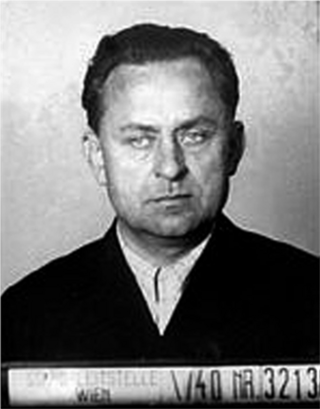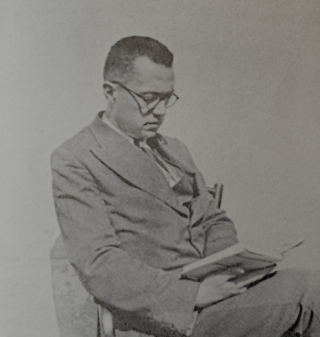Hofrat Dr. Josef Paul

Personalia
Born:
Died:
Profession:
Persecution:
Imprisonment 12.03.1938 - 02.04.1938,
Dachau concentration camp 02.04.1038 - 27.09.1939,
Mauthausen concentration camp 27.09.1939 - 10.02.1940
KZ Number:
Memberships
Curriculum Vitae
After completing his law degree and a doctorate in law and 17 months of court practice, Josef Paul took up a post as a police lawyer at the Ottakring district police station in Hubergasse.
At the time of the Anschluss, he was working as a police commissioner in Vienna-Währing, where he was particularly involved with illegal National Socialists. He was arrested at eight o'clock in the morning on 12 March 1938 by four armed SA men on the basis of an already prepared list and initially taken to the Ottakring district police station, his place of work, where his colleague Dr. Josef Auinger (1897-1961) signed the arrest warrant. Auinger had been a member of the then illegal NSDAP since 1934 and had investigated and reported Josef Paul. He was transferred from Ottakring to the Rossauer Lände police detention center. Shortly afterwards, Leopold Figl is also placed in this single cell, where 4 other prisoners are also held. Until the end of March he is in the prison in Sennhofgasse [today Hahngasse]. On April 1, 1938, he arrives at the concentration camp in Dachau on the first transport, the so-called Prominent Transport, as number 53 on the Gestapo list, from where he is transferred to Mauthausen on September 27, 1939.
He is released on February 10, 1940 after 23 months in a concentration camp without being interrogated beforehand and without any hearing on the reasons for his imprisonment. Weighing 37 kg, Josef Paul returned home and was drafted into the air force just a few months later, on December 1, 1940. At the end of the war, he was taken prisoner of war by the Americans on February 25, 1945 and was able to return home on September 10, 1945.
Dr. P., as police commissioner, took a particularly harsh stance against the NS, for whom he always imposed the highest level of punishment. [...] He did not limit his official actions against NS to his official district, but also reached beyond it on his own initiative.
Dr. Paul's conduct was such that dismissal cannot be considered at this time.
On March 12, 1938, Josef Paul witnessed the demise of a free and independent Austria with the invasion of the German Wehrmacht. On the very day of the occupation, he was arrested at eight o'clock in the morning by four armed SA men on the basis of an already prepared list and initially taken to the Ottakring district police station, where his colleague Dr. Josef Auinger (1897-1961) signed the arrest sheet. Auinger had been a member of the then illegal NSDAP since 1934 and had investigated and reported Josef Paul. He was transferred from Ottakring to the Rossauer Lände police detention center. Shortly afterwards, Leopold Figl was also admitted to this single cell, where 4 other prisoners were also held. Until the end of March, he was held in the prison in Sennhofgasse [today Hahngasse]. On April 2, 1938, he is deported on the first transport, the so-called 'Prominent Transport', as No. 53 on the Gestapo list to the Dachau concentration camp. From there, he was transferred to the Mauthausen concentration camp on September 27, 1939.
[...] then [I] was taken out of the apartment on March 12, 1938 at about eight o'clock in the morning on the basis of a list drawn up by four armed SA men. [...] They took me to the Ottakring police station. [...] Then I was transported to Roßauer Lände. I was first put in a solitary cell. [...] And in the afternoon [...] I got an addition. It was none other than our later Federal Chancellor Leopold Figl. [...] Then we were partly moved to the Vienna municipal prison in Hahngasse. We had larger rooms there, and I was there until the end of March. On the last day of March we were suddenly shaved etc., we were fingerprinted. After that we were gathered together - again in other cells - according to the letter. We knew then that we were going somewhere. [...] We soon realized that we probably wouldn't be taken to Wöllersdorf - we would have been taken there by car - but that we were going to Dachau.
Without prior interrogation and without any hearing on the reasons for his imprisonment, he is released on February 10, 1940 after 23 months in a concentration camp. Weighing 37 kg, Josef Paul returned home, worked briefly at the Allianz insurance company and was drafted into the Luftwaffe just a few months later, on December 1, 1940. At the end of the war, he was taken prisoner by the Americans on February 25, 1945. There he witnessed the liberation of Austria and the re-establishment of the Republic.
Josef Paul returned home on September 10, 1945 and resumed his duties at the Vienna Federal Police Directorate. He becomes the founder and head of the foreign department, which is responsible for repatriations. Between 1949 and 1970, he was the city captain of Vienna's 9th district and in 1971, the city captain of Vienna's 1st district and head of the criminal police department of the Vienna Federal Police Directorate. He was involved on a voluntary basis in the newly founded Austrian People's Party (ÖVP), the ÖVP-Kameradschaft der politisch Verfolgten und Bekenner für Österreich and the schoolmates' association Jung-Dietrich.

Places
Persecution:
Residence:
Citations
- Krause, Peter/Reinelt, Herbert/Schmitt, Helmut (2020): Farbe tragen, Farbe bekennen. Katholische Korporierte in Widerstand und Verfolgung. Teil 2. Kuhl, Manfred (ÖVfStG, Wien), p. 245/246.
Wiener Stadt- und Landesarchiv (WStLA)
Österreichisches Staatsarchiv (ÖStA)
Dokumentationsarchiv des österreichischen Widerstands (DÖW)
Archiv der Universität Wien
Paul, Josef: Der erste Transport, in: Erzählte Geschichte, Bd. 2
Matricula Online
